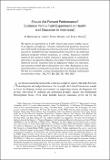Should Aid Reward Performance? Evidence from a Field Experiment on Health and Education in Indonesia
Author(s)
Olken, Benjamin A.; Onishi, Junko; Wong, Susan
DownloadOlken_Should aid.pdf (953.2Kb)
PUBLISHER_POLICY
Publisher Policy
Article is made available in accordance with the publisher's policy and may be subject to US copyright law. Please refer to the publisher's site for terms of use.
Terms of use
Metadata
Show full item recordAbstract
We report an experiment in 3,000 villages that tested whether incentives improve aid efficacy. Villages received block grants for maternal and child health and education that incorporated relative performance incentives. Subdistricts were randomized into incentives, an otherwise identical program without incentives, or control. Incentives initially improved preventative health indicators, particularly in underdeveloped areas, and spending efficiency increased. While school enrollments improved overall, incentives had no differential impact on education, and incentive health effects diminished over time. Reductions in neonatal mortality in nonincentivized areas did not persist with incentives. We find no systematic scoring manipulation nor funding reallocation toward richer areas.
Date issued
2014-10Department
Massachusetts Institute of Technology. Department of EconomicsJournal
American Economic Journal: Applied Economics
Publisher
American Economic Association
Citation
Olken, Benjamin A., Junko Onishi, and Susan Wong. “Should Aid Reward Performance? Evidence from a Field Experiment on Health and Education in Indonesia.” American Economic Journal: Applied Economics 6, no. 4 (October 2014): 1–34.
Version: Final published version
ISSN
1945-7782
1945-7790